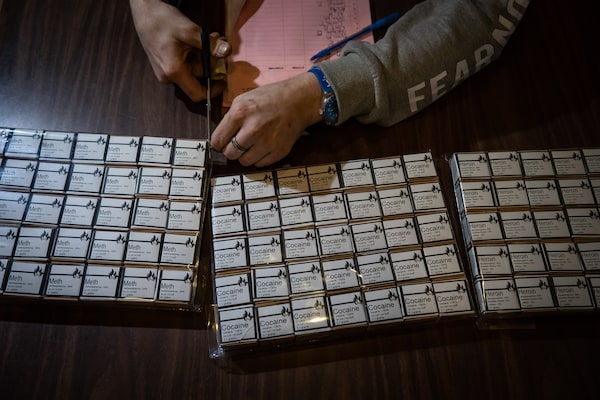
A tested supply of cocaine, heroin and methamphetamine is readied for distribution in Vancouver, on Feb. 9.DARRYL DYCK/The Canadian Press
B.C. Premier David Eby acknowledged that communities are worried about decreasing public safety after the province’s precedent-setting move to decriminalize the possession of personal amounts of illicit drugs connected with overdoses, but said municipalities have tools to place limits on public drug use.
Mayors from Kamloops to Kelowna have complained the government’s policy change in January has led to more open drug use and the Opposition BC United has called on the NDP to assure communities that open drug use in parks, playgrounds and beaches will be prohibited.
But the Premier refused to say whether he will roll back the policy, which in January made British Columbia the first jurisdiction in Canada to decriminalize small amounts of opioids, cocaine, methamphetamine and MDMA intended for personal possession. Mr. Eby said at a Monday news conference that municipalities have significant authority to address drug use in public places. And if they need more support, his government is happy to talk with them, he said.
But he stopped short of specifying what measures his government would bring in to address the public safety concerns.
“What I’m hearing from some mayors is that for various reasons, these tools are not as effective for them or police as we would like them to be and that there’s an opportunity for the province to provide additional support,” Mr. Eby said at a news conference.
“We will work with local governments to address these issues that they see to make sure that we’re moving forward in a good direction.”
Last week, during Question Period, Mr. Eby told the legislature his government would respond to the concerns from municipalities. “Our government will work with local government partners to make sure that those protections are in place.”
“Nobody wants this activity affecting our kids, and we will do something.”
Mr. Eby did not provide a timeline or specify details for municipality protection. “Finding solutions that will be effective and lasting is critical,” he said. “We’ll take the time necessary to work with our local government partners to address their concerns,” he said.
The provincewide change to decriminalization took place in January and marked a monumental shift in policing drug-related offences. The change meant that officers would no longer arrest people on possession charges alone and police would be barred from confiscating illegal drugs.
The change was meant to lessen the stigma of addiction and motivate people struggling with drug use to seek help – a part of the response to a toxic drug crisis that is killing six people in the province daily.
Nanaimo Mayor Leonard Krog, who served as a long-time NDP MLA, said the public is losing patience because of increased incidents of unprovoked violence and rampant drug use. “People are frustrated, afraid, and they’re also still, mercifully, deeply filled with compassion,” he said.
The mayor said the issue is at the forefront of people’s minds. He added that people on the streets have a need for treatment and care.
Mr. Krog said he became mayor to focus on duties such as attracting business and looking over roads. “I didn’t become a mayor to deal with provincial and federal responsibilities,” he said.
Editor’s note: The Globe and Mail erroneously reported British Columbia has moved to decriminalize the possession of personal amounts of all illicit drugs. In fact, the province has moved to decriminalize opioids, cocaine, methamphetamine and MDMA, the illegal drugs that are most commonly associated with overdose in the province.